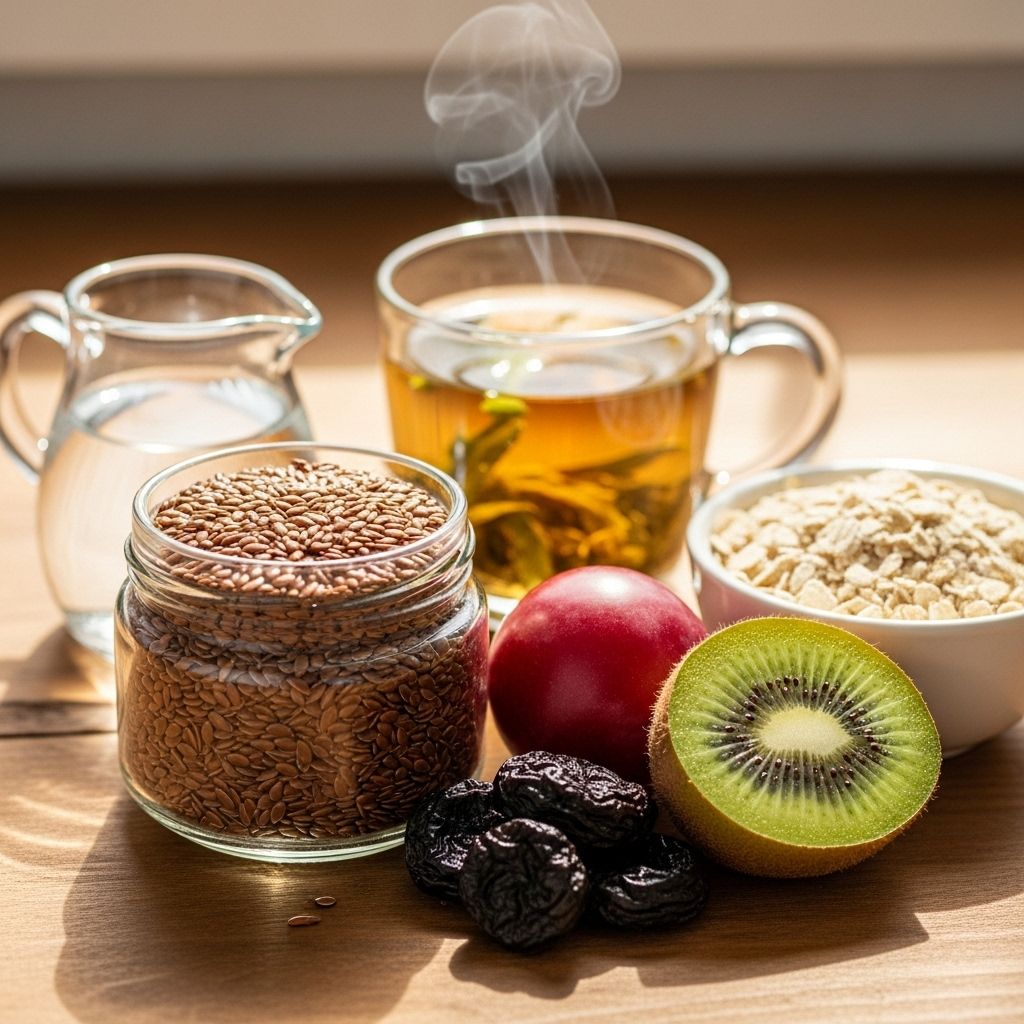Effective Constipation Remedies at Home
Natural Solutions for Relieving Constipation

Introduction to Constipation Remedies
Constipation is a common issue affecting millions worldwide, causing discomfort and impacting daily life. Fortunately, many effective remedies can be applied at home to alleviate this condition. This article provides a comprehensive overview of natural solutions, dietary changes, and lifestyle adjustments that can help relieve constipation.
Natural Remedies for Constipation Relief
Before resorting to medication, consider these natural remedies that can help stimulate bowel movements and improve digestive health:
- Senna Tea: Known for its stimulant laxative properties, Senna tea helps the digestive tract contract and move waste through the intestines.
- Lemon Juice: Drinking a glass of lemon juice mixed with water before bed and upon waking can stimulate bowel movements.
- Olive Oil: Consuming a teaspoon of olive oil on an empty stomach can lubricate the digestive system, making it easier for stool to pass.
- Prune Juice/Dried Prunes: Rich in sorbitol, prunes are effective in drawing water into the gut, softening stool and promoting bowel movements.
- Stewed Apricots: Similar to prunes, apricots are high in sorbitol and can help alleviate constipation.
- Apples and Pears: High in fiber and water content, these fruits help soften stool and ease bowel movements.
- Fennel: Fennel seeds can be added to warm water to create a natural laxative drink, aiding digestion.
- Kiwis: Containing the enzyme actinidin, kiwis stimulate the upper digestive tract and improve bowel movements.
- Blackberries and Raspberries: High in fiber and water, these fruits are beneficial for constipation relief when consumed raw.
- Sauerkraut: Contains probiotics that can help improve gut health and reduce constipation.
- Omega-3 Oils: Found in fish, flaxseed, and hemp, omega-3 oils help lubricate the intestines.
- Pulses: Legumes like lentils and beans are rich in fiber, promoting smoother bowel movements.
- Yoghurt & Kefir: Probiotic-rich dairy products help soften stool and improve gut health.
Dietary Adjustments for Constipation Relief
Making the right dietary changes can significantly alleviate constipation. Here are some key adjustments:
- High Fiber Foods: Increase intake of whole grains, fruits (especially apples, pears, and prunes), vegetables, and legumes like beans and lentils.
- Adequate Hydration: Ensure sufficient fluid intake, including water, juices, and water-rich foods like soups and fruits.
- Avoid Dairy: Reduce or manage dairy intake, especially if there’s a sensitivity to milk proteins.
Lifestyle Changes to Prevent Constipation
Beyond dietary adjustments, several lifestyle changes can help prevent constipation:
- Regular Exercise: Engage in physical activities to stimulate bowel movements and improve overall health.
- Stress Management: Practice stress-reducing techniques like meditation or yoga to help regulate digestive functions.
- Good Bowel Habits: Establish a regular bowel routine, allowing time for undisturbed bathroom visits.
Constipation Remedies for Children
Children can also experience constipation, but it’s important to use gentle and safe remedies:
- Abdominal Massage: Massage the abdomen and encourage leg cycling movements to help pass stools.
- Natural Foods: Offer prunes, apples, and pears as natural laxatives.
- Hydration: Ensure adequate water intake, especially for children over one year old.
Frequently Asked Questions (FAQs)
Q: What are the most effective natural remedies for constipation?
A: Senna tea, olive oil, prune juice, and kiwis are among the most effective natural remedies for relieving constipation.
Q: How can I prevent constipation through diet?
A: Consuming high fiber foods like fruits, vegetables, and legumes, and staying hydrated can help prevent constipation.
Q: Are there specific exercises that can help with constipation?
A: Regular physical activity can help stimulate bowel movements, but there isn’t a specific exercise for constipation relief.
Q: Can constipation be a sign of an underlying medical condition?
A: Yes, persistent constipation can be a symptom of an underlying medical condition. It’s important to consult a healthcare professional if symptoms persist.
Conclusion
Managing constipation effectively involves incorporating natural remedies, dietary adjustments, and lifestyle changes. By understanding and applying these strategies, individuals can find relief from this common issue and improve their overall digestive health.
References
- https://www.bladderandbowel.org/bowel/bowel-treatments/8-remedies-to-relieve-constipation-bladder-bowel-community/
- https://www.templehealth.org/about/blog/doctor-approved-home-remedies-constipation
- https://www.unitypoint.org/news-and-articles/home-remedies-for-constipation-in-kids
- https://bgapc.com/natural-remedies-relieve-constipation/
- https://www.medicalnewstoday.com/articles/318694
- https://www.mayoclinic.org/diseases-conditions/constipation/diagnosis-treatment/drc-20354259
- https://www.healthline.com/health/digestive-health/how-to-make-yourself-poop
- https://my.clevelandclinic.org/health/diseases/4059-constipation
- https://www.houstonmethodist.org/blog/articles/2023/sep/5-home-remedies-for-constipation/
- https://www.niddk.nih.gov/health-information/digestive-diseases/constipation/treatment
Read full bio of medha deb












